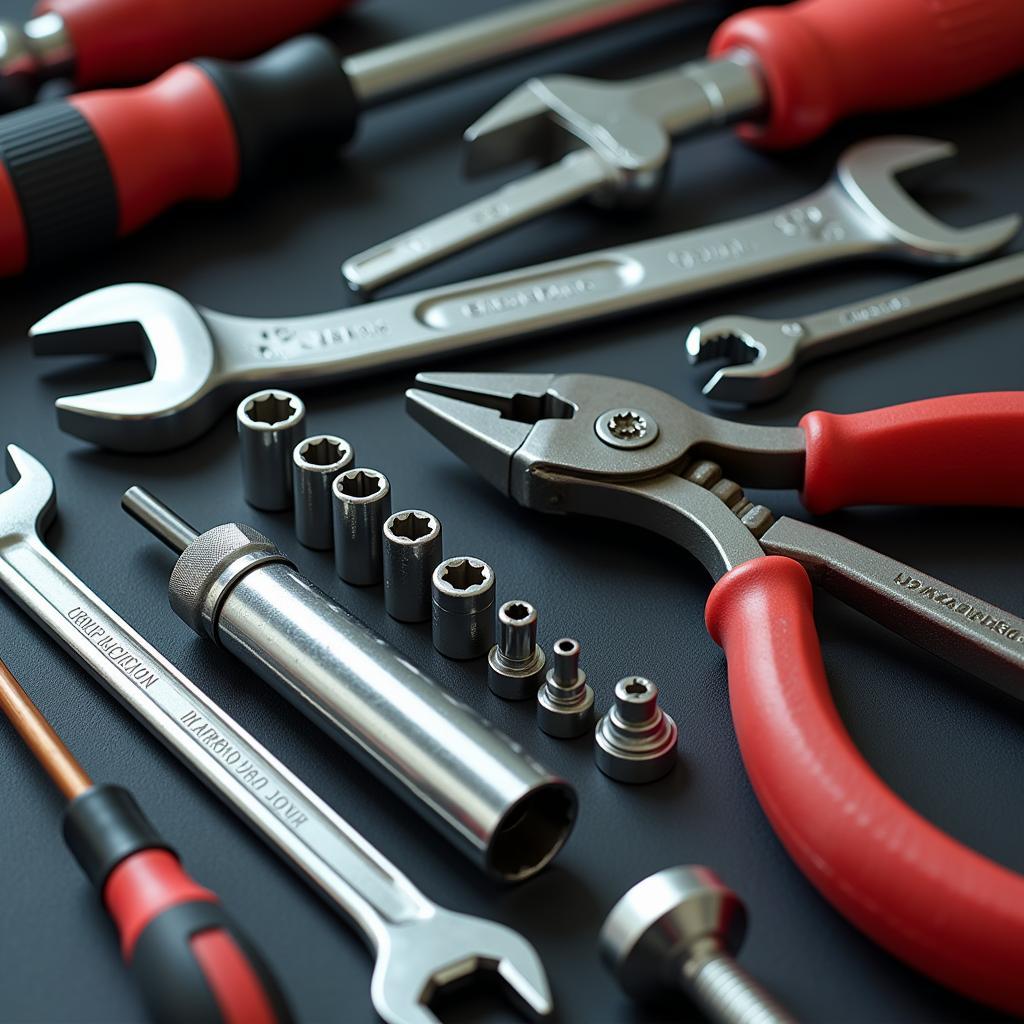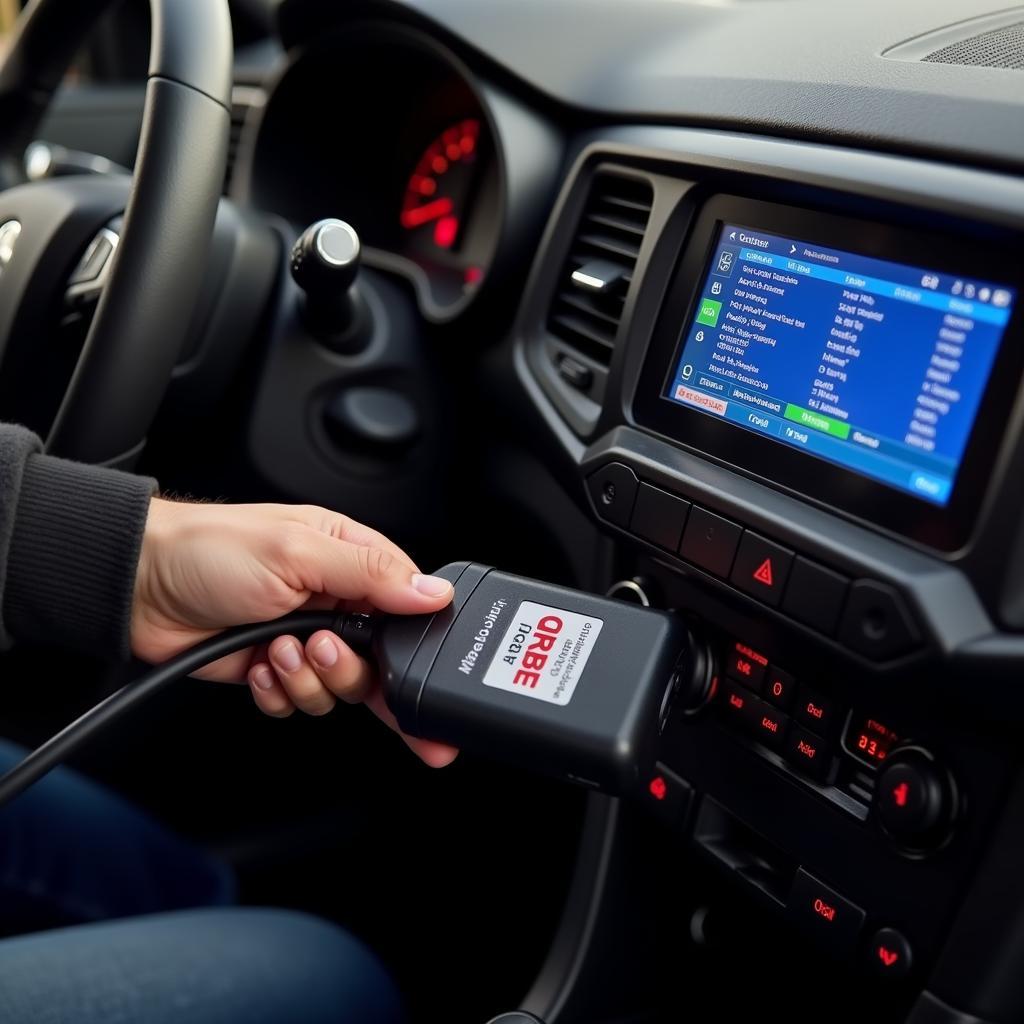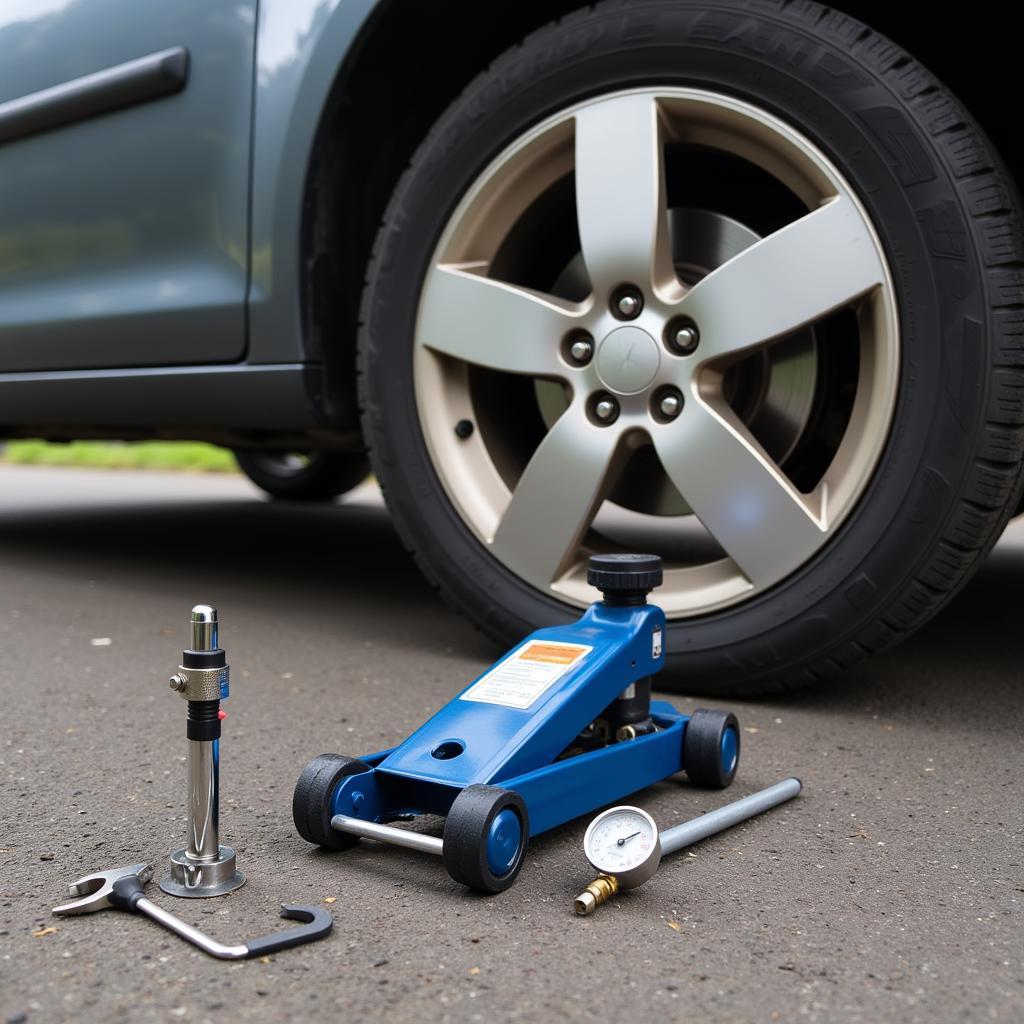Working on your car can seem daunting, but having the Essential Tools To Work On Your Car makes all the difference. Whether you’re a seasoned DIY mechanic or just starting out, a well-stocked toolbox is crucial for tackling basic maintenance, repairs, and emergencies. This guide will walk you through the essential tools every car owner should have. After reading this, you’ll be prepared for anything from a flat tire to a simple oil change.
Basic Hand Tools: The Foundation of Your Car Toolkit
Every car toolkit should start with a solid foundation of basic hand tools. These are the workhorses you’ll rely on for countless tasks. First, you’ll need a good set of screwdrivers. Invest in a set with various sizes and types, including Phillips, flathead, and Torx. These will allow you to remove screws and fasteners of all shapes and sizes. Next, wrenches are a must-have. Get a combination set with both open-end and box-end wrenches in both metric and standard sizes. This will cover the vast majority of bolt sizes you’ll encounter on your car.
 Essential Hand Tools for Car Maintenance
Essential Hand Tools for Car Maintenance
Don’t forget pliers! A good pair of slip-joint pliers and needle-nose pliers will be invaluable for gripping, bending, and cutting wires, as well as removing stubborn clips and fasteners. A ratchet and socket set is also essential, allowing you to quickly loosen and tighten nuts and bolts in tight spaces. Finally, add a sturdy hammer and a set of punches to your collection for those times when a little persuasion is needed. Having these basic hand tools will equip you for a wide range of common car repairs.
Diagnostic Tools: Unlocking the Secrets of Your Car
Beyond the basics, diagnostic tools are becoming increasingly important for modern cars. A simple OBD-II scanner can tell you what’s wrong with your car by reading the error codes from the car’s computer. This can save you a trip to the mechanic and help you pinpoint the problem quickly.
 Using an OBD-II Scanner for Car Diagnostics
Using an OBD-II Scanner for Car Diagnostics
“Investing in a good OBD-II scanner is like having a mechanic in your pocket,” says automotive expert, Michael Stevenson. “It’s an essential tool for any car owner who wants to understand and address their car’s issues.”
For those who want to delve deeper, a multimeter allows you to test electrical circuits and components, helping you diagnose electrical problems.
Essential Tools for Tire Changes and Roadside Emergencies
Flat tires happen. Be prepared with a jack, a lug wrench (that actually fits your car!), and a spare tire in good condition. A tire pressure gauge is also vital for maintaining proper tire inflation, which improves fuel efficiency and tire longevity.
 Roadside Emergency Kit for Tire Changes
Roadside Emergency Kit for Tire Changes
“Being prepared for roadside emergencies gives you peace of mind,” says Susan Miller, lead instructor at the National Automotive Technician Education Foundation. “Knowing you have the right tools can turn a stressful situation into a manageable one.” Don’t forget a good flashlight and some basic safety gear like gloves, reflective triangles, and a first-aid kit. You may also consider adding jumper cables for a dead battery and a small tool kit like the ones found at essential car tools trunk.
Building Your Car Tool Collection Over Time
You don’t need to buy everything at once. Start with the car workshop tools list pdf and gradually expand your collection as you gain experience. Consider the types of repairs you’re comfortable tackling and the tools you need in your car workshop before making any purchases. Having the right tools for your 2 car garage tools is equally essential if you have a larger space.
Understanding the appropriate tools or working equipment for the career is paramount whether you’re a DIY enthusiast or considering a professional path.
Having the essential tools to work on your car empowers you to take control of basic maintenance, saving you money and giving you the satisfaction of working on your own vehicle. Remember to always consult your car’s owner’s manual for specific instructions and safety precautions.
FAQ
- What are the most basic car tools? Screwdrivers, wrenches, pliers, a hammer, and a ratchet and socket set.
- Do I need a diagnostic tool? An OBD-II scanner is highly recommended for modern cars.
- What do I need for a tire change? A jack, lug wrench, spare tire, and tire pressure gauge.
- How do I choose the right tools? Consider your skill level and the types of repairs you plan to do.
- Where can I find more information on car tools? Check out our resources on DiagFixPro.com
Situations Where These Tools Are Needed
- Flat Tire: Jack, lug wrench, spare tire, tire pressure gauge.
- Dead Battery: Jumper cables.
- Loose Bolt or Screw: Screwdrivers, wrenches, ratchet and socket set.
- Checking Fluid Levels: Wrenches, funnel.
- Minor Electrical Issues: Multimeter.
- Diagnostic Trouble Codes: OBD-II scanner.
Further Questions to Explore
- How to use an OBD-II scanner effectively?
- What are the different types of wrenches and their uses?
- How to properly maintain your car tools?
- What are the essential safety precautions when working on your car?
For more information, explore our other articles on DiagFixPro.com.
Need help? Contact us via WhatsApp: +1(641)206-8880, Email: [email protected] or visit us at 910 Cedar Lane, Chicago, IL 60605, USA. We have a 24/7 customer support team.

Leave a Reply